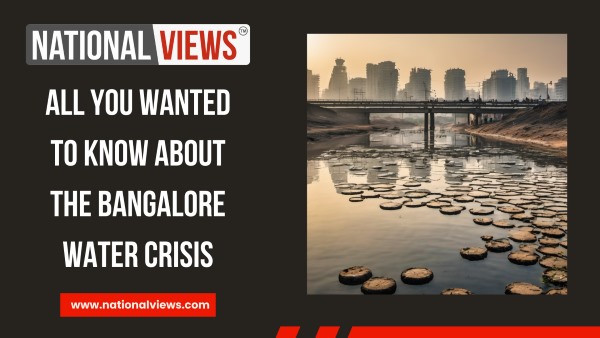Did you know that a plush society in Bangalore had asked its residents to use disposable cutlery and wet wipes to clean their hands and faces? Due to severe water shortage, even tanker services couldn’t provide sufficient clean water. Yes, the Bangalore Water Crisis is real! Let’s check all about why and how Bangalore is facing a severe water famine.
Understanding the Root Cause of Bangalore Water Crisis:
Bangalore, often called the Silicon Valley of India, relies heavily on the Cauvery River and groundwater for its water supply. However, lack of rainfall and poor management have led to inadequate coverage of the daily water needs of the growing population.
The demand for water in Bangalore being 2,600 MLD (million litres per day) far outstrips the available supply, leading to several challenges. Many wells have dried up, leaving residents to rely on expensive water tankers. This shortage disrupts daily life and poses hygiene concerns, increasing the risk of water-borne diseases.
What has caused the crisis?
Unplanned urban development has interrupted the water crisis in Bangalore. The city’s rapid growth has outpaced infrastructure development, leading to water scarcity. Additionally, the situation is exacerbated by the lack of rainwater harvesting systems, as rainwater remains unused and instead contributes to flooding.
Another major problem is water wastage. Pipeline leaks and inconsequential water consumption further strain already limited water resources.
What has been the Daily struggles of residents in The Great Water Crisis of Bangalore:
Bangaloreans face challenges every day due to the water crisis. They have to wait hours for water tankers to arrive, disrupting their daily routine. Managing basic needs like cooking, cleaning and bathing becomes a struggle.
Hygiene concerns are on the horizon as access to clean water becomes uncertain. The risk of water-borne diseases that affect the health of residents, especially children and the elderly, is increasing. (Source)
The grief of the residents further increases with the financial burden of buying water in cisterns from water tankers. Many families struggle to afford the high cost of water, which impacts their overall quality of life.
What is the Government Doing to Save Bangalore
To make every drop count, the government is asking all Resident Welfare Associations (RWAs) to install tap aerators on faucets. These little attachments can significantly reduce water flow without affecting the daily chores.
The government is pushing for the completion of the Cauvery Stage-V project, which will bring more water from the Cauvery River to Bangalore. This is a long-term solution that will ensure a more stable water supply in the future.
The officials are also looking at smarter ways to use existing resources. One idea is to use treated wastewater for non-essential purposes like construction. This will free up freshwater for drinking and other essential needs.
By fixing leaky pipes and reminding everyone to avoid using hoses for car washes and watering gardens, we can all help conserve this precious resource. It’s a combined effort – the government with its plans and the people of Bangalore with everyday water-saving habits – that will ensure getting through the crisis. (Source)
The Penalty and Fines Imposed by Bangalore Water Supply and Sewerage Board on Citizens
In Bengaluru, the Bangalore Water Supply and Sewerage Board (BWSSB) imposed fines totaling Rs 1.1 lakh within three days for violations related to using potable water from the Cauvery river and borewells for car washing.
The BWSSB issued a notice on March 10, announcing a penalty of Rs 5,000 for each instance of using potable water for non-essential purposes like car washing, gardening, and large construction projects. The board enforced these restrictions due to the city’s water crisis, with a focus on conserving drinking water resources. Spot fines were collected from violators, with 22 cases identified and penalties imposed accordingly.
The BWSSB emphasized the importance of curbing wastage, especially in activities like car washing where significant amounts of water are used inefficiently. Most violations were reported in the southeast division of the board, with efforts ongoing to address water scarcity issues and promote responsible water usage in Bengaluru
Also Read: Want to be Surrounded by More Greenery? Consider Buying Sustainable Homes In Bangalore


